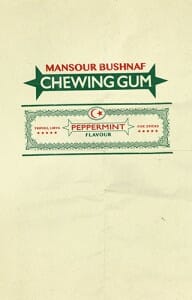A Novel That Represents ‘A Complete Generation of Libyan Writers and Intellectuals’
Libyan poet, translator, and short-story writer Ghazi Gheblawi has been enthusiastically tweeting about Mansour Bushnaf’s Chewing Gum, now out in English translation, by Mona Zaki, from Darf Publishers. So, what’s the big deal about Chewing Gum?
 Gheblawi initially wrote on his blog, Imtidad:
Gheblawi initially wrote on his blog, Imtidad:
This is a book that I first read in Arabic, when it was published by a small independent publisher in Cairo in 2007, the novel which wasn’t allowed to be distributed by Libyan authorities inside the country, was handed over from one reader to another and became famous for its satirical criticism of the Qaddafi regime.
Now in its new resurrected form in English, “Chewing Gum” has proven to be one of the best novels in modern times to describe in a satirical, cynical style the Libyan society under tyranny. The novel’s absurd approach to many aspects of a society striving to live against political and social challenges, introduces us to the reality of despotism.
Reading “Chewing Gum” for the second time in this excellent English translation, and especially after three years of Qaddafi’s demise, I felt that this novel will continue to be a must read to understand an obscure country and an isolated society that are still in the process of forging a nation that was fragmented under decades of colonialism, war, and dictatorship.
Not having seen the short (125-page) novel, I asked Gheblawi, over email, what was so special about it.
ArabLit: What makes this book so special? Vs. other Libyan novels and short stories written in the same era?
Ghazi Gheblawi: This is a novel that was written by a prolific essayist and playwright, which gave it a unique style among other works of Libyan novels.
I can also claim that it is a novel that represents a complete generation of Libyan writers and intellectuals, that were the first modernists in Libyan literature in 1970s and were unfortunate to face directly the brutality of the Libyan regime in its early years, which took more than a decade of their lives in imprisonment.
The novelist was the first to approach the subject of imprisonment in a work of literature and got it published, though not successfully distributed, under the Qaddafi regime.
AL: What are its brothers and sisters, parents and grandparents? To what literary tradition(s) does Chewing Gum belong? Libyan, Arabic, other?
GG: Chewing Gum has many characters that belong to absurdism and absurdist literature, and that’s not strange given that Mansour Bushanf has written many plays that belong to that school of literature, it is belongs more to European rather than Arabic or Libyan literatures, it can belong to a literature that was written in Eastern Europe under Communism, the likes of Bertolt Brecht, Milan Kundera, and others.
AL: Do you remember where you were when you first read the book? Was there a particular passage or character that had an effect on you?
GG: I first read the novel when I got a copy from a friend in London in 2007, it was published in Cairo by a small publisher, who printed few hundred copies of the novel, which was full of typos and editing mistakes, which was unfortunate.
The most intriguing passages in the book were those subtitled as “The Park,” describing in a very concise witty style the history, culture and social aspects of Libya, which I sometimes think it will be a suitable introduction to anyone who wants to understand the current affairs of Libya.
AL: How was the experience of reading it in English different? Did you see anything in a different way, reading the same happenings, but now in an English vernacular?
GG: Reading the novel in English was like reading it for the first time, given that the original Arabic edition wasn’t well published. I approached the English edition as if it was a book written originally in English, which was an enjoyable experience, and in the guise of the events of the past three years in Libya and the region, the novel proved to be timely and can be read many times without losing its shine or intrigue.
